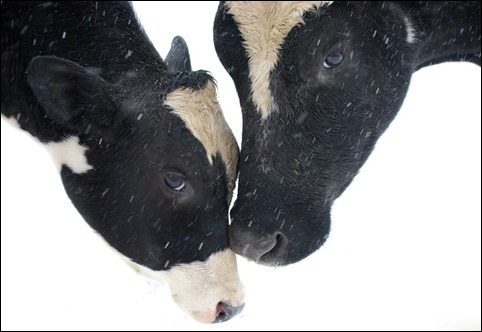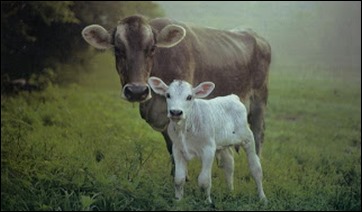Even Cows Get the Blues
Earlier this month a young bull escaped from a slaughterhouse in Brooklyn and ran for his life through the streets of NYC. He ended up two miles away in a field in Prospect Park. The bull, nicknamed Jimmy K, was taken to the Skylands Animals Sanctuary in East New York, Brooklyn.
Jimmy K’s desperate effort to live is characteristic of what all cows feel on their way to slaughter. And a new peer-reviewed paper in the journal Animal Behavior and Cognition, entitled “The Psychology of Cows” authored by Dr. Lori Marino and doctoral student Kristin Allen, provides the scientific evidence to support this conclusion.
Cows share a number of cognitive capacities with other highly intelligent species such as dogs, chimpanzees, and humans.
The authors reviewed dozens of peer-reviewed studies of cognition, emotion, personality and social behavior of domestic cows. They found that cows possess surprisingly high emotional sensitivity, including the ability to “catch” each other’s feelings. This sophisticated capacity, known as “emotional contagion,” occurs when one individual experiences an emotion by witnessing that emotion in another individual. Shown in many socially complex species, including humans, this adaptive ability to share the feelings of others allows both cows and humans to use social cues to deal with challenging situations.
In addition to their empathic qualities, cows are also deeply affected by their own emotions, resulting in a cognitive effect on decision making akin to what we call “pessimism” and “optimism.” For example, the emotional and physical pain of early separation from their mothers and dehorning – two common practices in the dairy and beef industries – can result in a negative feeling that can last for days and impact their willingness to play or take on a new challenge.
With intriguing examples based on an extensive review of the scientific literature to date, the authors conclude that “Cows lead rich and intense social lives; experience a range of emotions; and rely on one another for comfort.” For example, they:
 Show excitement and signs of pleasure when they master intellectual challenges, suggesting that cows have a keen awareness of the consequences of their own actions
Show excitement and signs of pleasure when they master intellectual challenges, suggesting that cows have a keen awareness of the consequences of their own actions- Differentiate between individual humans, other cows, and members of other nonhuman species
- Possess long-term memories
- Can navigate complex mazes
- Love to play with objects and one another
- Experience judgment bias, a cognitive effect on decision-making analogous to what we call “pessimism” and “optimism”
- Experience emotions, exhibit emotional contagion, and show some evidence for feeling empathy
- Stay calmer and less stressed when accompanied by fellow cows even during stressful situations
- Form strongly bonded social groups, with mothers and calves sharing an especially powerful emotional connection
- Learn from each other
- And have distinct, individual personalities.
Dr. Marino explains:
“We have shown that cows share a number of cognitive capacities with other highly intelligent species such as dogs, chimpanzees, and humans.
“The capacities explored in this paper also emphasize the need for additional non-invasive comparative behavioral research with cows in natural settings.
“At present, the available research on cows focuses overwhelmingly on how these animals can be used to maximize the profits of farming industries. Consequently, most studies explore questions such as: “How can we make cows grow bigger bodies in smaller spaces?” and “How quickly after her calf is taken away can a mother cow be re-impregnated to maximize her efficiency?”
“We want to encourage future research to shift away from a focus on how to use cows. Until then, we hope that insight into the feeling, thinking lives of cows inspires a future in which cows are not used as commodities but, rather, celebrated for the individuals they are.”
This is the fourth paper produced with grant money from Farm Sanctuary’s The Someone Project, an endeavor aimed at using scientific evidence to raise the public’s understanding of farm animal cognition and behavior. The first three papers focused on the cognitive and behavioral complexities of fish, pigs, and chickens respectively, and generated international attention.
A white paper based on this publication is also available. Also, the paper is reviewed at Newsweek magazine.


